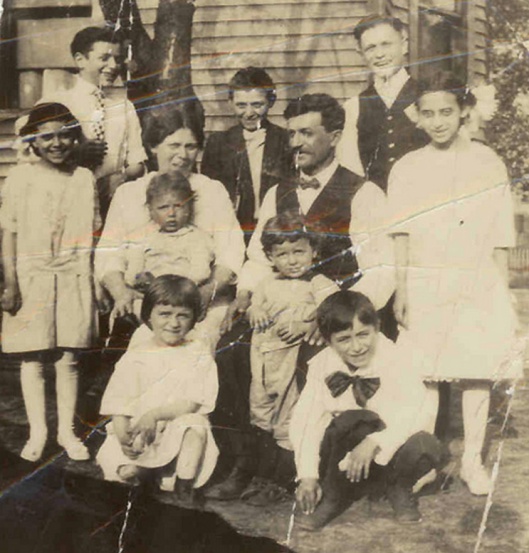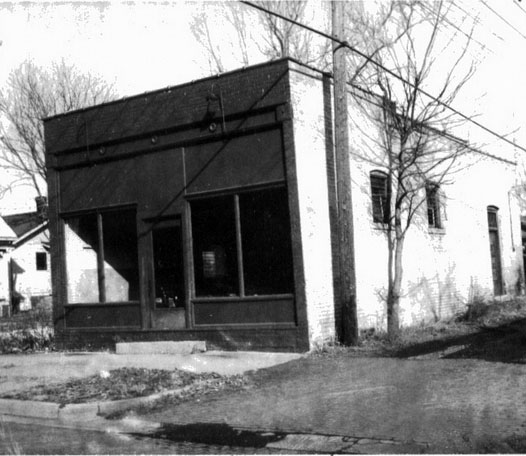By William Cellini, Jr.

David and Anna (Machnovitz) Broida family, circa 1915.
Decades before the Holocaust of the 1930s and 1940s ravaged Jewish communities across Europe and Russia, there was a persecution of Russian Jews that followed the assassination of Tsar Alexander II in 1881. His assassination by revolutionary socialists sparked pogroms and restrictive laws against Jews living in the Russian Empire including the Litvak community. Litvaks (the Yiddish word for the Jews of Lithuania) were deprived of their rights as citizens as a result of the restrictions. As a result of those hindrances, the period of the 1880s to the 1910s was a time of mass emigration by Jews in Russia. In fact, the first Jews to emigrate from the Russian Empire were Litvaks. (Bernheimer, C. S. (1905). The Russian Jew in the United States: Studies of social conditions in New York, Philadelphia, and Chicago, with a description of rural settlements. New York: J.S. Ozer., P. 26); (Lithuanian Jews Make Big Impact in South Africa. Reuters, Jun. 12, 1998)
David Broida was part of the Litvak masses and he emigrated in 1888 ultimately settling in the Midwest with his wife, Anna Machnovitz, and their children. David was the eldest son of Jacob and Hannah (Weinstein) Broida from the village of Eišiškės in southeastern Lithuania, a community with a 900-year-old Jewish shtetl. The family arrived in Springfield after first spending time in Cincinnati, Ohio. David worked as a cigar maker in Cincinnati, so when he arrived in Springfield, he continued the trade.
The family first lived on East Reynolds Street in a predominately African American neighborhood and by 1906, they moved to 401 North 14th near Mason Street into another predominately African American neighborhood known as the “badlands” northeast of Springfield’s Levee district. (Ancestry.com, 1900 U.S. Federal Census); (There Was Once a World: A 900-Year Chronicle of the Shtetl of Eishyshok., Little, Brown & Co., 1999); (City of Springfield Directory, R.L. Polk & Co., 1905); (City of Springfield Directory, R.L. Polk & Co., 1906); (Selby, P. (1912). Historical Encyclopedia of Illinois, Vol. 2. Chicago: Munsell Pub. Co.)

Broida’s Grocery with Eddie, Herman, and Joe, 1934.
In the badlands, David opened a tavern at 14th and Mason but within a year, the neighborhood took-up a petition to have his license revoked. Greatest criticism came from Rev. Jason Bundy, the pastor of St. John’s African Methodist Episcopal Church. His congregation was across the street and it faced the tavern. According to news reports in the archives of the Illinois State Journal-Register, it was either Broida or Bundy who offered a bribe to stop the anti-tavern petition from going to the city council; however, the details about the incident are unclear in the press of that period. What is known is that David Broida ultimately lost his liquor license and he transformed the tavern into a butcher shop and grocery store in 1907 around the same time his younger brother Morris opened his clothing store in the 2000 block of Peoria Road. These two stores were the start of the Broida family retail business in Springfield. (ISJ, Feb. 5, 1907, P. 7)
Among the heavy concentration of European and Russian Jews who emigrated to the U.S., portions of their community achieved an impressive upward mobility within two generations after emigration. The Broida family typified the early-20th century immigrant success story, as they were an exemplary face among the small Litvak community in Springfield.
David fast became a popular and successful merchant in town and he opened a second store at 1900 South 15th street in the early 1900s. Dealing with the public afforded him a degree of notoriety, and so he ran for alderman in Springfield’s 1st Ward. However, before the campaign got underway, his brother Morris went bankrupt over a bad business deal. Creditors claimed he was hiding over $12,000 and sued him in federal court. Morris was ordered to pay a reduced settlement but could not produce the money, and so the judge gave him an eight-month jail sentence on account of contempt.In the aftermath, Morris and his family left Springfield and moved to St. Louis. For David, his campaign for Alderman was not successful. He came in third behind two challengers; one of them a Lithuanian-born tavern owner named William Botwinis. (Broida’s General Stores. ISR, Dec. 5, 1909, P. 63); (Want Broida to Produce $15,000. ISR, Jan. 19, 1915, P. 6);(Broida Case Taken Under Advisement. ISR, Jun. 18, 1915, P. 9); (Ancestry.com); (WWI Draft Registration of Max Broida, Ancestry.com)
Perhaps a bit over confident about his initial political foray, David again ran as a candidate for the city council in the February 1911 primary. According to the Historical Encyclopedia of Illinois, Broida gave a statement to the press saying he’d, “put his whole time and attention to fulfilling the duties of the job to see that the city was given a clean government”. He was not alone in thinking about a political career that winter. Following Springfield’s vote to replace the aldermanic form of government with a commission form, a crowded field of 105 candidates vied for only four open seats on the new city council. After obtaining a mere 183 votes in the primary, David likely realized that politics was not in his best interest. (Historical Encyclopedia of Illinois, Vol. 2, 1912); (How the Candidates Finished in City’s First Commission Primary. ISR, Mar. 1, 1911, p. 1)
After his 1911 election disappointment, he again tried his hand at the tavern business by opening a wholesale liquor store in the 700 block of East Washington Street, the heart of Springfield’s Levee. According to the 1910 Springfield City Directory, the site had been a tavern previously operated by the Lithuanian-born Joseph Meiron. Try as he may, David Broida did not succeed in operating a liquor store and a grocery at the same time and he abandoned the Washington street location less than a year into the venture. Creditors later sued him for payments he owed on the liquor stock. As a side note, city directories indicate the address of the liquor store on East Washington was later named the “Joseph Sutkaitis Saloon” pointing to continued Lithuanian connections in the Levee district during that era. (ISJ, Oct. 24, 1914, P. 7); (Council Makes Generator Award. ISR, Jun. 30, 1914, P. 6)

Herman “Bud” Broida’s Market, 401 N. 14th St., circa 1934.
David’s strength was best put to use selling retail goods and he moved his grocery to 14th and Cook streets while retaining his building on Mason so he could rent it to tenants for extra income. By 1916, his grocery business was going so well he built a two-story brick complex at the Cook Street site and the family lived in an annex connected to the store. The building served as Broida’s Grocery for many years and eventually David’s sons, Eddie, Herman and Joe, all lent a hand working at their father’s grocery (Building Permits. ISR, Dec. 20, 1916, p. 12).
In 1924, David Broida passed away at the age of 49 and was buried at Beth Hamedrosh Hagodol Cemetery in St. Louis. According to Joe’s daughter, the family belonged to Temple B’rith Sholom, one of three temples in Springfield that existed before WWII. After David’s passing, his wife Anna moved to St. Louis to be with her daughter Ida (Broida) Dorman. Anna passed away in St. Louis in 1952. Of all the Broida sons, it was Herman who expanded the grocery business by re-opening their father’s location at 14th and Mason in 1932. In addition, the brothers built “Broida’s Store #2” on Springfield’s west side at 1308 South College Street. Herman eventually moved out of state leaving Joe and Eddie to tend to the grocery businesses. (Obituary, Mrs. Anna Broida. ISJ, Dec. 2, 1952, P. 16); (Springfield City Directory, Jefferson’s Printing and Stationary Co., 1931); (Springfield City Directory, H.L. Williamson Co., 1934)
The two brothers carried-on but struggled as chain grocery stores gradually replaced family-run independents in the period after the Great Depression. Turning away from the grocery business, the brothers began selling furniture. They each opened a series of home furnishing stores across Springfield and Eddie was the first to open a store on East Washington. He died in Springfield in 1978 at the age of 71.

Broida’s (vacant) College and South Grand Avenue location, 1967.
According to Joe Broida’s daughter, her father tried to keep the grocery at 14th and Mason in operation but by the 1940s, the badlands neighborhood was razed to build the John Hay Homes, a subsidized multi-family apartment complex, so Joe moved his operation to Cook Street and renovated the old grocery store there by re-branding it, “Re-Nu Furniture and Appliances”. He later opened Southtown Furniture in 1963 and remained there until his retirement in 1982. He died in Arizona in 1995. (Eddie I. Broida obit. ISJR, Dec. 5, 1978, P. 28); (Workers Begin Razing of Buildings in Vast Housing Project. ISJ, Aug. 8, 1940, P. 4); (Broida Store Opening. ISJ, Oct. 30, 1963, P. 9); (Ancestry.com, Social Security Death Index)
All photos except College Street store courtesy of the H.B. Broida family collection.

Susan Bernotas Potter said:
Joe Broida was my uncle. He married my mothers Sister Catherine. Nice article.
b.zemaitis@comcast.net said:
Good job Sandy. Wish we could communicate wit you. Grazina & Ben
Linda Dorman said:
David and Anna Broida were my great-grandparents and Ida (Broida) Dorman, who died in 1998, was my grandmother. It was lovely to read more about my family history. I recognized some of their names but many passed away before I was born.
sandyb52 said:
Linda, their story is also in my book, available on amazon.com and at Noonan’s Hardware at 8th and North Grand, near the front register. Glad you enjoyed–please share with other family who may be interested. Sandy
Jody (Russell) Burke said:
David and Anna Broida were my great-grandparents and ida (Broida) Dorman was my grandmother. This is really interesting to read about the family. I did purchase the book and also bought one for my Mother, Priscilla (Dorman) Russell. I remember spending time with Joe and Eddie.
sandyb52 said:
Glad you enjoyed the blog and book! Please spread the word…Sandy
Joyce and Buddy York said:
My husband Buddy York (Joseph M. York) is part of the Broida family, and his great-grandparents settled in Carnegie, PA in the late 1800’s; His great-grandparents were Joseph York and Kate Broida, also from Eishoshyk. In the 1990’s we attended a Broida Family Reunion in Las Vegas, and we were once in a directory. We would very much like to have someone get in touch with us who can tell us how to re-connect, add the names of our children, grandchildren and great-grandchild to the directory, and to “re-join” the family. and support your efforts.
Would appreciate any lead you can provide. Thank you, Joyce York
sandyb52 said:
Hi, Joyce and Buddy. It’s Sandy Baksys, owner of the Lithuanians in Springfield blog site. I checked with the writer of the Broida family post and unfortunately, he has since lost his notes and contacts used in writing the piece. He did, however, look up info for a descendant named Terry Broida. He hopes this is the right phone number: (217) 747-0280.